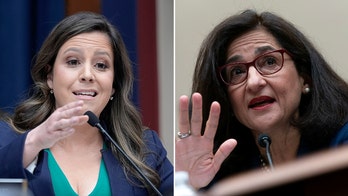
Move over, Cancun. Step aside, Acapulco. Another island could soon become the Spring Break Capital of the World.
It may be time to party hearty ... in Cuba.
If some U.S. lawmakers are right, American tourists could hit the beach in Cuba, and help defeat the forces of evil who have led the island nation for nearly half a century.
A bipartisan group of 20 senators is calling for a repeal of America's 47-year-old travel ban to Cuba, saying the proposal will weaken the Castro regime and "make a difference for democracy."
"The best antidote to totalitarianism is the American citizen traveling, the ability to actually communicate with other people," Sen. Chris Dodd, D-Conn, said at a news conference this week. "The one thing that totalitarianism can't stand is light, is communication, is information."
But anti-Castro groups call that argument specious.
"The senator means well. But we know, the road to hell is paved with good intentions," said Frank Calzon, executive director of the Center for Free Cuba.
Calzon agreed with Dodd that the best way to fight totalitarianism without going to war is disseminating the truth.
"One can agree that information is essential and disagree that hundreds of thousands of Americans drinking mojitos at the beach and thousands engaging in sex with young boys and girls won't bring democracy to Cuba," Calzon said, adding that American tourism did not end totalitarianism in Chile under Augusto Pinochet, South Africa under P.W. Botha or Cuba under Fulgencio Batista.
"The idea that American tourists are going to bring democracy to Cuba and other totalitarian countries flies in the face of every factual analysis in the last 100 years," he said.
Proponents of the bill have not set a date for the Senate to take up the legislation, but they are confident that they have the necessary votes to move forward with the measure.
President Obama signaled during last year's campaign that he was open to loosening restrictions on Cuba. An Obama administration official told FOXNews.com that the White House is reviewing current practices in relation to travel and remittances.
"We hope to see evidence that the government has committed itself to address the disparities among citizens with regards to human rights and economics," the official said, noting that Obama has stated it makes "moral and strategic sense to lift restrictions for family visits."
"We continue to evaluate our key objections, the need for democratic reform and improving human rights while looking at ways to meet these goals that the president has laid out," the official said.
In 1962 the United States established the travel ban along with a number of other restrictions, including a trade embargo, soon after Fidel Castro's takeover of Cuba. His brother Raul now rules the island nation, located 90 miles from the Florida coastline.
Tourism is already considered the heart of the Cuba' economy, with more than 2 million people visiting each year, mostly from Canada and Britain, Italy, Spain and Germany.
Last year, tourism generated a record of more than $2.7 billion in revenue, a 13.5 percent increase over the previous year, the Cuban government reported.
Cuban tourism has remained strong while the number of visitors to other Caribbean destinations has dropped amid the world financial crisis. International travel operators say Cuba remains popular because many visitors can buy relatively cheap, all-inclusive packages and can budget trip costs well in advance.
William Maloney, chief executive officer of the American Society of Travel Agents, said lifting the U.S. travel ban would open the floodgates to American tourists seeking to explore a forbidden territory.
"The pent-up curiosity about what the island and country is like would create a lot of demand for first-time visitors to go," Maloney told FOXNews.com. He said Americans traveled in droves to South Africa when apartheid ended and to Germany when the Berlin Wall collapsed and to Vietnam after the war ended.
"Americans have a curiosity to go where they were not welcomed or allowed to before," he said. "Americans should have a right to travel anywhere. When those rights are curtailed or denied, it stores up pent-up demand that will be satisfied at some later date."
Maloney said if the travel ban is lifted, the first wave of tourists will probably be accommodated on cruise ships out of Miami, bringing to Cuba anywhere from half a million to a million American visitors a year. Then airlines would start flying there.
But Calzon said he believes the more lawmakers learn about the facts on the ground in Cuba, the less likely they are to favor lifting the ban.
"Lifting the travel ban means the most hostile elements of the Cuban government will get an injection of our currency," he said. "The tourist industry is controlled and staffed by the Cuban government. If Washington wants to transfer dollars to the Cuban military, that's one way of doing it.
"Secondly, lifting anything on Cuba without getting anything in return goes against U.S. interest. Cuba is part of an anti-American hostile coalition in the region that includes Venezuela."
Other critics of the proposal, including Cuban-born Sen. Mel Martinez, R-Fla., agree, claiming that any U.S. tourism dollars will only bolster the Castro regime.
"This is the time to support pro-democracy activists in Cuba, not provide the Castro regime with a resource windfall," he said in statement. "Changing travel restrictions for U.S. citizens will simply allow Americans to contribute to resources available to the Castro regime to perpetuate its repression.
"My fellow senators should be standing in solidarity and showing support for the 11 million Cubans who are suffering under the Cuban regime, instead of making it easier for Americans to vacation in Cuba."
But supporters of the proposal argue the travel ban has not worked, either.
"This is a failed policy that has failed for 50 years and it is long past the time to change the policy," Sen. Bryon Dorgan, D-N.D., said Tuesday. "Punishing the American people in our effort to somehow deal a blow to the Castro government has not made any sense at all."
FOX News' Mosheh Oinounou and The Associated Press contributed to this report.




